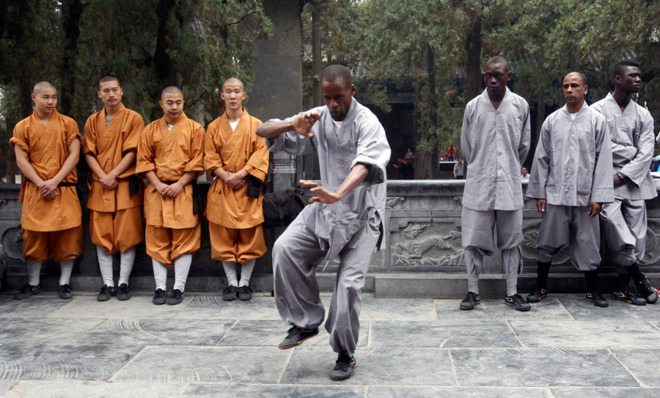Why China wants African students to learn Mandarin
Measuring soft power

A free daily email with the biggest news stories of the day – and the best features from TheWeek.com
You are now subscribed
Your newsletter sign-up was successful

While China's dramatic economic and trade impact on Africa has caught global attention, there has been relatively little focus on its role in education.
But there are important questions raised by China's education push into Africa. Why does China run one of the world's largest short-term training programs, with plans to take 30,000 Africans to China between 2013 and 2015? Why does it give generous support to 38 Confucius Institutes teaching Mandarin and Chinese culture at many of Africa's top universities, from the Cape to Cairo?
And why is China one of the very few countries to increase the number of full scholarships for Africans to study in its universities, with a total of 18,000 anticipated between 2013 and 2015?
The Week
Escape your echo chamber. Get the facts behind the news, plus analysis from multiple perspectives.

Sign up for The Week's Free Newsletters
From our morning news briefing to a weekly Good News Newsletter, get the best of The Week delivered directly to your inbox.
From our morning news briefing to a weekly Good News Newsletter, get the best of The Week delivered directly to your inbox.
At its simplest, China's efforts can be seen as just an example of "win-win" cooperation, or as an illustration of "common development." In other words, it is claimed to be just one side of a process of mutual benefit: China is gaining something from Africa, and Africa from China.
According to the Chinese embassy in Pretoria, China currently sends 100,000 tourists to South Africa, and 1,000 students annually. These are not aid projects, but private initiatives. There are similar examples of win-win cooperation with many other countries in Africa.
Cooperation in the development of human resources is part of China's soft power engagement with Africa (as opposed to its considerable "hard power" of infrastructure development, trade, or material resources — still a large focus of China's engagement with the continent).
It is this soft power that Lu Shaye, director general of African Affairs at China's ministry of foreign affairs, commended in 2013 as an "indispensable" element in China's diplomacy with Africa. Essentially, for him soft power means "strengthening the cultural exchanges between China and Africa."
A free daily email with the biggest news stories of the day – and the best features from TheWeek.com
It is for this reason that education and training cooperation has been one of the "red threads" of China's engagement with Africa since 1956 when China established diplomatic relations with Egypt.
Power in numbers
This whole discussion about the exact purpose of China's provision of training awards and of scholarships has been overtaken by the growth of trainee and student numbers. In 2011, there were almost 300,000 foreign students in China — the great majority of who were actually self-supported.
Exactly the same is true of African students in China: While scholarship numbers in 2011 were just over 6,000, the self-supported students were more than double, at over 14,000. In other words, China is evidently an attractive destination for international study for Africans, quite apart from its scholarship provision.
The same point could be made about China's formal promotion of Mandarin and Chinese culture and history via its Confucius Institutes and Confucius Classrooms. This is possibly the largest language promotion project the world has ever seen, taking place in just nine years since the first Confucius Institute was opened in Seoul in November 2004. Yet it too is dwarfed by the sheer numbers of students worldwide who are deciding to learn Chinese, outside the framework of the Confucius institutions.
A final point about China-Africa training is that it is even harder to calculate the large number of Africans who are acquiring skills in Chinese firms, large and small, from Senegal to Ethiopia, and from Egypt to Zimbabwe.
This is very different from training in enterprises associated with other countries such as the U.S. or France in Africa. This is because of the presence of perhaps as many as a million Chinese "settlers", traders and entrepreneurs who have turned up in almost all the countries of the African continent over the last decade.
Of course their main purpose is trade, rather than training Africans — similar to the purpose of the Europeans and Indians who came to Africa in earlier decades. But there are still more and more opportunities for Africans to learn on the job in Chinese firms and to use Mandarin.
More from The Conversation...
-
 Political cartoons for February 19
Political cartoons for February 19Cartoons Thursday’s political cartoons include a suspicious package, a piece of the cake, and more
-
 The Gallivant: style and charm steps from Camber Sands
The Gallivant: style and charm steps from Camber SandsThe Week Recommends Nestled behind the dunes, this luxury hotel is a great place to hunker down and get cosy
-
 The President’s Cake: ‘sweet tragedy’ about a little girl on a baking mission in Iraq
The President’s Cake: ‘sweet tragedy’ about a little girl on a baking mission in IraqThe Week Recommends Charming debut from Hasan Hadi is filled with ‘vivid characters’